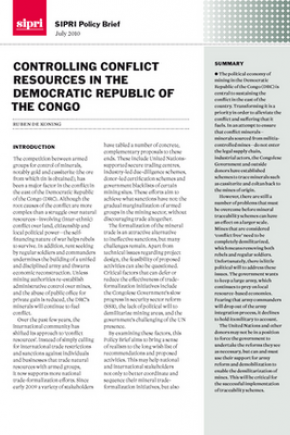Controlling Conflict Resources in the Democratic Republic of the Congo
However, there are still a number of problems that must be overcome before mineral traceability schemes can have an effect on a larger scale. Mines that are considered ‘conflict free’ need to be completely demilitarized, which means removing both rebels and regular soldiers. Unfortunately, there is little political will to address these issues. The government wants to keep a large army, which continues to prey on local resource-based economies. Fearing that army commanders will drop out of the army integration process, it declines to hold its military to account.
The United Nations and other donors may not be in a position to force the government to undertake the reforms they see as necessary, but can and must use their support for army reform and demobilization to enable the demilitarization of mines. This will be critical for the successful implementation of traceability schemes.

